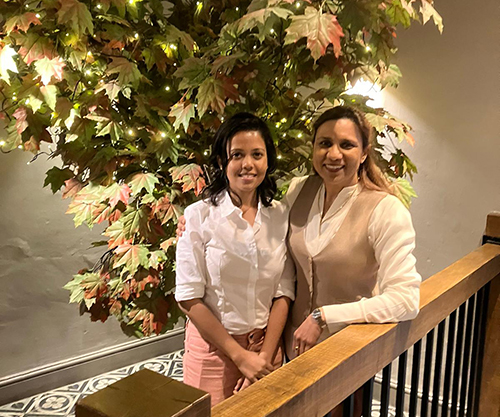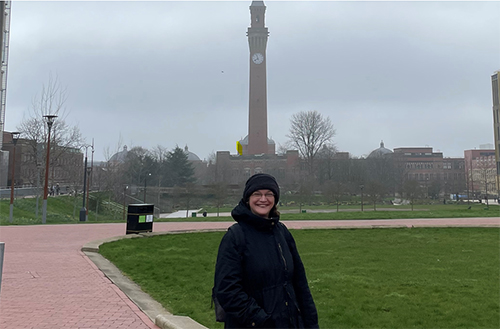Dr Vyshna Ravindran

Dr Vyshna Ravindran with Dr Kanta Kumar
Dr Vyshna Ravindran is currently here as a Visiting Research Fellow at the University of Birmingham, funded by India Institute. She has been honoured with the prestigious Women in Research Fellowship Award. Under the expert guidance of Dr Kanta Kumar, leading research in health inequalities in the UK in rheumatology and people living with chronic diseases, the wider team comprising seasoned researchers and clinicians. Among them are Professor Sheila Greenfield and Dr. Laura Kudrna from the University of Birmingham, Dr Rajeev Gupta from the University of Sheffield, and Professor Sunil Bhandari from Hull University Teaching Hospital, UK.
As chronic diseases rise, it's crucial to tackle their burden and meet the 2030 Agenda for Sustainable Development by exploring other treatment avenues. Not all patients respond to conventional medicine, prompting the need for alternative options. With Ayurveda gaining traction among UK patients, it presents a competitive alternative. Yet, healthcare professionals' perspectives on Complementary Medicine remain unknown.
Our groundbreaking research initiative seeks to delve into the awareness, attitudes, and practices of healthcare providers concerning Ayurvedic medicine in the management of chronic diseases, through a comprehensive cross-sectional survey tailored to the British context. This endeavour stands as a pioneering effort not just within the UK but across the entirety of Europe.
The anticipated outcomes of this survey hold immense potential to stimulate robust discussions surrounding Ayurveda's role in chronic disease management, thereby fostering collaborative synergies between allopathic and Ayurvedic practitioners, funders, researchers, clinicians and policy makers.
Professor Sandra Pillon and Dr Chris Wagstaff
 Professor Sandra Pillon
Professor Sandra Pillon
Prior to Chris travelling to Brazil, Sandra had supervised MSc student Sarah Foster in the data collection phase of her HSCE project investigating Craving/ Impulsivity/ Depression/Sexual behaviour amongst people who use illicit substances. When in the UK, Sandra was a joint supervisor for Sarah and the two other students, who have now submitted their three respective dissertations.
Two of those dissertations will be converted into submissions for international peer reviewed journals, and an abstract has been accepted at the European Conference Mental Health.
Between the two trips we have written two book chapters, both have been reviewed, accepted and are now in different stages of publication. One looking at the use of psychotropic medication with Brazilian youth and one discussing drug use in the over 50 Brazilian population.
Prof Pillon has also given input to one of my MRes students whose dissertation is investigating the experiences of drug use in the over 50s population in Birmingham. We have started to write up two intertwined studies investigating both the attitudes of Health Professionals towards suicide risk in hospitals and primary care centres.
Within that study there is a second study looking at the suicide statistics in emergency departments. My PhD student Ashwaq is involved in the writing up of this study where there are some interesting findings about suicide in the over 40s. We have submitted two grant applications:
Substance use in indigenous communities. Grant application made with CAPES, in the International congress workstream. This is a joint application with the University of Mato Grosso.
We have also submitted an application to investigate depression and substance use in the Quilombola communities (black population of African descent), with the Federal University of Goiás (UFGO). The population is socially excluded & low social determinants of health.
We have submitted papers to Portuguese Journal of mental health, Health Sciences, Nursing & Health Sciences, Drugs: Education, Prevention and Policy, and Journal of addiction Nursing. These papers are working their way through the publication systems. We have had one paper published in the last seven months in the Journal of Transgender Health.
We are making plans for five students to travel to Brazil in the autumn, to work on two HSCE projects – one investigating substance use and social support and one investigating the risks for children who work on the street.
For the latter project we are applying for UBBI seed funding, with the application due in mid-July.
Our five-year study looking at suicide among Brazilian high school students has now started and will complete in 2029.
Finally, we have had Luana over as an exchange student from USP, whom both Sandra and I have supported.